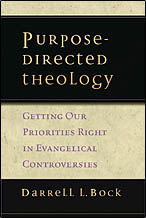Darrell Bock: Purpose-Directed Theology
 Darrell L. Bock, Purpose-Directed Theology: Getting Our Priorities Right in Evangelical Controversies (Downers Grove, IL: InterVarsity Press, 2002), 114 pages.
Darrell L. Bock, Purpose-Directed Theology: Getting Our Priorities Right in Evangelical Controversies (Downers Grove, IL: InterVarsity Press, 2002), 114 pages.
Darrell Bock’s Purpose-Directed Theology calls for a biblically grounded, theologically focused and culturally engaged evangelicalism. This work seeks to address both theological scholarship and a wider evangelical public. The back cover of the book summarizes his argument in a succinct and provocative way: “When the stakes are high, evangelicals don’t often engage each other well.” In other words, Bock is concerned with a critical view and correction of the use and direction of “energy” in evangelical spirituality, theology and ministry. The modest size of this volume should not distract from the fundamental issues the author addresses. Here is a proposal for evangelical theology worthy of discussion and application by pastors, teachers, academics, and church leaders.
This book proceeds from a concern about where evangelicals stand today and the question of where they should be going in the future. Bock uses particular localized discussions as examples of how evangelicals have engaged and should engage each other. The first chapter takes on the work of Stanley Grenz, Renewing the Center (Grand Rapids: Baker, 2000), a recent proposal for the direction of evangelicalism. The critical reader is well-advised to read Grenz’s book before reading Purpose-Directed Theology. Bock laments the lack of discussion on the role of Scripture in Renewing the Center and argues for a central place of God’s Word in evangelical theology. The evangelical approach to Scripture he proposes is one of “critical realism”–an awareness and knowledge of reality that should be engaged critically in the way it is perceived. In turn, the reading of Scripture as a divinely rooted and authoritative text should proceed with careful attention to the larger theological, philosophical and hermeneutical debate. Practically, Bock calls for “solidly grounded theologian-philosopher-exegetes in evangelicalism” (p. 33) who operate within a “solid, dialogical community” (p. 34). The subsequent chapters reveal that much of evangelicalism is still far from Bock’s ideal.
Bock sketches the outlines of contemporary evangelicalism from both a historical and an organizational perspective. Historically, he argues, the diverse forms of evangelicalism exhibit a common desire to combine theology and mission as the life-giving center of evangelical growth and vitality. A commitment to Scripture (sola Scriptura), the centrality of Christ (solus Christus) and the salvation he brings by faith (sola fide), the uniqueness of grace (sola gratia) and the desire to give glory to God alone (soli Deo Gloria) represent the major lessons evangelicals glean from its history. From an organizational perspective, these lessons underscore the fundamental need to preserve different types of organizations. Bock distinguishes between tradition-specific, bounded institutions and tradition-inclusive, public-square institutions. In order to fulfill its missionary mandate, he argues, evangelicalism needs public-square institutions that operate ecumenically in order to challenge those outside the evangelical community and invite them to hear God’s voice. Reflection and discussion thus become key components in Bock’s vision of the evangelical future. Tightly defined boundaries in all organizations lead in his opinion to self-consumed debates that keep evangelical’s various strands from developing more intimate contact with each other. As a result, evangelicalism weakens its potential cultural impact, neglects its missionary mandate, and misdirects its energies. He successfully illustrates that too much time and effort is wasted on in-fighting. In Bock’s own words: “an evangelicalism that turns every disagreement into a major battle risks turning all its energy inwards” (p. 79). His advice is simple: go slow! Evangelicals do well to observe the importance of solid biblical interpretation, recognize the insights from the history of Christian thought, resolve disputes communally, practice intellectual empathy, engage in a forthright argument, and only then accept or reject a theological model. Bock concludes with a reminder about priorities. A purpose-directed evangelicalism should focus its energies beyond internal debates to its mission to a lost and dying world.
Category: In Depth, Winter 2004


